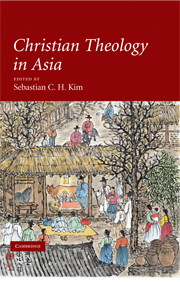Book contents
- Frontmatter
- Contents
- Contributors
- Preface and Acknowledgements
- 1 FORMATION OF CHRISTIAN THEOLOGIES IN ASIA
- 1 Introduction: mapping Asian Christianity in the context of world Christianity
- 2 The Mystery of God in and through Hinduism
- 3 Waters of life and Indian cups: Protestant attempts at theologizing in India
- 4 From abandonment to blessing: the theological presence of Christianity in Indonesia
- 5 Studying Christianity and doing theology extra ecclesiam in China
- 6 Christian theology under feudalism, nationalism and democracy in Japan
- 7 The Word and the Spirit: overcoming poverty, injustice and division in Korea
- II THEOLOGICAL THEMES OF CHRISTIANITY IN ASIA
- Index
- References
6 - Christian theology under feudalism, nationalism and democracy in Japan
Published online by Cambridge University Press: 05 June 2012
- Frontmatter
- Contents
- Contributors
- Preface and Acknowledgements
- 1 FORMATION OF CHRISTIAN THEOLOGIES IN ASIA
- 1 Introduction: mapping Asian Christianity in the context of world Christianity
- 2 The Mystery of God in and through Hinduism
- 3 Waters of life and Indian cups: Protestant attempts at theologizing in India
- 4 From abandonment to blessing: the theological presence of Christianity in Indonesia
- 5 Studying Christianity and doing theology extra ecclesiam in China
- 6 Christian theology under feudalism, nationalism and democracy in Japan
- 7 The Word and the Spirit: overcoming poverty, injustice and division in Korea
- II THEOLOGICAL THEMES OF CHRISTIANITY IN ASIA
- Index
- References
Summary
Christian theology in Japan takes a number of forms, but still it is meaningful to talk of Japanese Christian theology. On the one hand, Japanese Christian theology could be understood negatively as a nationalistic and introverted theology in Japan; on the other hand, it could be understood positively as an indigenous and original theology in Japan. Moreover, Christian theology in Japan is not merely the theology of Japanese theologians; it is also the theology of Japanese Christians and at the same time Christian theology conducted, while living in Japan, by those who are not Japanese. The reality of Christian theology in Japan will be seriously biased if any one of these categories is missing or is under-represented.
The first stage of Christian theology in Japan begins with the introduction of Catholic Christianity under feudalism in which feudal lords governed society. In this period non-Japanese Christian theology, or western Christian theology brought by missionaries, as well as the theological education of Japanese Christians, are the dominant features. The second stage develops through the introduction of Protestant Christianity, and the reintroduction of Catholic theology under nationalism, within a modernized nation of Japan. While some Japanese theologians emerged from under the nationalistic system, others conformed to it. The third stage begins with the avalanche of missionaries of various denominations who engaged with the process of the democratization of Japan, following its defeat in 1945. Since then the study of western theology and the indigenization of Christian theology have been undertaken in many ways.
- Type
- Chapter
- Information
- Christian Theology in Asia , pp. 109 - 128Publisher: Cambridge University PressPrint publication year: 2008



